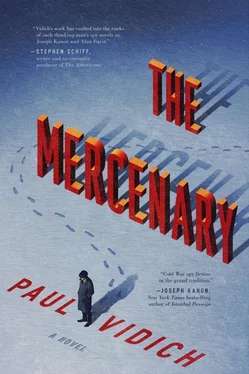After two days of dark confinement, the bright fluorescent lights disoriented him, and he was suddenly pushed into a wooden chair at the witness table. Lime-green plaster walls were bare except for a water stain from a ceiling leak and a large portrait of Lenin. Beside it, there was a ghost aura of darker pastel where dead Chernenko’s portrait had once hung, and two limp flags stood on either side of the judge’s table. Garin saw Talinov, who sat beside the prosecutor Rostov, and there were five other people that Garin hadn’t seen before.
Comrade Posner sat alone in the prisoner’s dock wearing a prisoner’s gray smock and slippers. He had files open in front of him at the small defendant’s table, and he looked up when Garin entered. His flowing gray hair now fell over his ears, and his eyes were shadowed with worry. Garin almost didn’t recognize him.
“Is this him?” the judge asked.
“Yes,” Rostov said. “Aleksander Garin. We are presenting him as a witness against the defendant, who, if I may repeat to the court, is accused of capital offenses under Articles 70 and 72 of the RSFSR Penal Code.”
Garin looked across the faces in the room, and then he settled on the judge. He knew that the proceedings had been going on for hours, possibly for days. The judge had documents piled at her side, nearly blocking the stenciled name plate on the table: V. Ulrich, Chairman . Garin submitted himself to the courtroom’s proceedings, stating his name, occupation, and nationality.
“Mr. Garin,” the chairman said when he was done. “This is the Military Collegium of the Supreme Court of the USSR. You are here as a fact witness in a sensitive matter. You are obliged to cooperate, and you are required to give truthful answers. Do you understand? Do you need a translator?”
Garin, unrehearsed and unprepared, stood, believing he was required to do so.
“Sit down. Do you understand?”
“Yes. I don’t need a translator.”
She nodded at Rostov. “Proceed.”
Rostov rose from his table, gathered himself, and moved to the center of the room, looking once at Garin. He held files in one hand, which he slapped against his other palm, and stopped suddenly. The prosecutor looked from Posner to Garin and then back at Posner.
“Mr. Garin, do you know the defendant, Dmitry Posner?”
Garin hesitated.
Rostov rephrased his question. “Do you know his name? Have you met him?”
“I know the name.” Garin remembered the prosecutor’s nasally voice, his false charm, and the bead of sweat that formed on his upper lip. He remembered his questions from the cell, and he tried to think a chess move ahead, sacrificing a useless fact to test the man’s game. He felt the eyes of the room on him. An answer existed, and the outcome that would follow from his answer was his only way to control the room.
“Can you point him out?”
Garin indicated the prisoner in the dock, whose face had drained of color. Posner bore his guilt stiffly.
“It may surprise you that defendant Posner was convicted of bribery and unlawful possession of foreign currency in connection with trade union corruption in a separate case in Zamoskvoretsky District Court. Posner used his privileged position in the KGB to fill his itching palm, and he laundered the money overseas.”
Garin sat morosely and listened to Rostov’s plodding accusations, detailing how Posner’s knowledge of Swiss banking helped him use shell companies, which he controlled through nephews he appointed as directors, to work around restrictions on a Soviet citizen’s possession of foreign currency. “All this activity,” Rostov said, looking around the courtroom, “was documented in the Party’s anti-corruption campaign, and this man”—he pointed to a subdued Posner—“was convicted of various crimes, including misuse of office, false statements, and undermining social order. He took cash for favors and used cash to bribe bankers to launder money through overseas accounts. He owns an apartment and an automobile in London. He engaged in malicious anti-Soviet agitation and organized criminal activity prohibited under Articles 70 and 72 of the Penal Code.”
Rostov turned again to Garin. “This trial stems from evidence found during investigations conducted in the first trial.” Rostov presented Garin with a single printed page from the file he held. “Have you seen this?”
Garin recognized the name of the bank at the top of the account statement, and he saw one small, dollar-denominated transfer that had been circled. There was no account name on the statement. It was a numbered account.
“This is your account, correct?” Rostov said. “Account number P12278910Z at Compagnie de Banque et Investissements, located at Rue du Rhone 96-98, Geneva. Can you confirm that?”
Garin guessed that he was being led down a path of forking choices; he couldn’t know if his answers would lead to a way out or take him deeper into a labyrinth. Rostov already had his answer, but the process of the trial and its theater required a show. None of this mattered to him, but all of it mattered to his release. He had only to submit himself to the questions to find a way out. His mind saw the room as a two-dimensional maze where to escape he had to do the opposite of what was expected of him.
“Yes, this is my account,” he said. “These are my funds. Where did you get this?”
“Thank you. And the sum here of nine thousand, nine hundred and fifty US dollars was electronically transferred to your account by Posner?”
Garin said nothing.
“It doesn’t matter. I will come back to that. Look at this, please.”
Garin took two schematics of look-down radar designs that were stamped as official court exhibits.
“Let me direct your attention to the very bottom,” Rostov said. “Do you see the serial number? The underlined sequence of letters and numbers: 207X-1803851820-93. Do you see that?”
“Yes.”
“Can you tell me what it is?”
“I have no idea.”
“I will tell you. The first four digits identify the unique copy machine that was used to make a duplicate of the drawing. The second set of numbers are the date and time the copy was made, and the last two are the number of pages copied. Have you seen this document before?”
“No.”
“Are you sure?”
“Yes.”
“Let me direct your attention to the bottom of the document. Here.” Rostov pointed. “Do you see the stamped identification—‘Top Secret’? In English. You don’t have to answer. I will stipulate it is there.” Rostov stepped back. “Can you tell me, Mr. Garin, how a classified Soviet military schematic copied on a KGB photocopier ended up marked ‘Top Secret’ in English?”
Garin tossed the paper back at Rostov, dismissing it. “This is a cleverly doctored forgery.”
“You work for the Central Intelligence Agency, correct?”
“I am a consular officer who works on human rights.”
“How does a human rights officer obtain a Swiss bank account that receives a deposit from a KGB disbursement account?” Rostov tapped his file slowly and waited for Garin’s answer.
Garin had his eyes on the document, staring numbly, while his mind tried to come up with a plausible lie.
“Let me suggest an answer,” Rostov said. “Defendant Posner has an office on the seventh floor of KGB Headquarters. It is near the copy machine that was used to produce these documents. He made these copies, and he supplied them to you, didn’t he?”
“No. And I wouldn’t know. I know nothing about any of this, except that your so-called facts are inventions of your imagination.”
Rostov turned to Garin. “We know there is a traitor inside the KGB who is passing documents to the CIA—camera, film, and a radio transmitter were taken from the CIA chief of station in Red Square. Do you know George Mueller?”
Читать дальше












